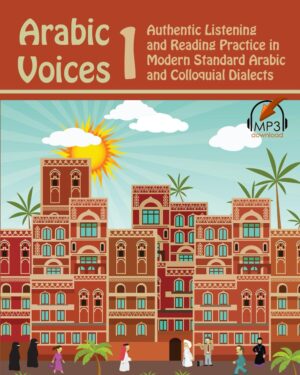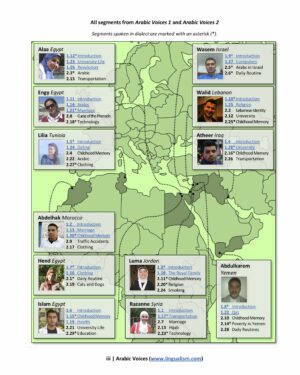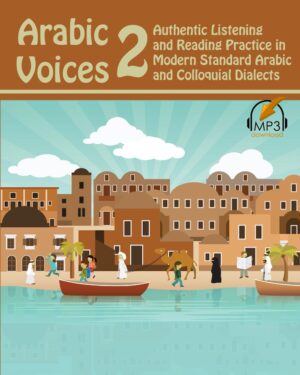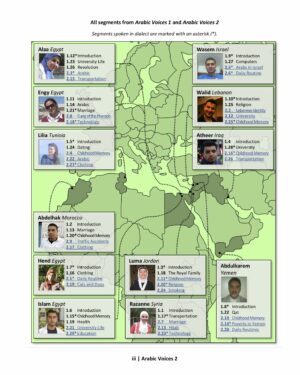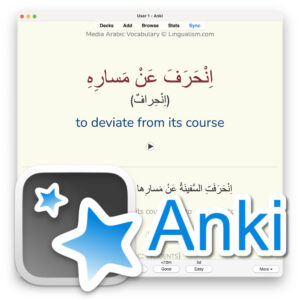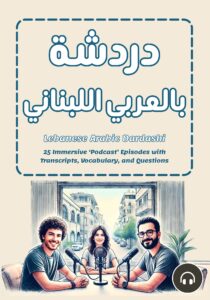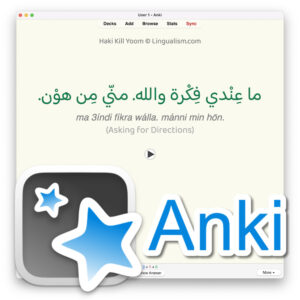Home » Modern Standard Arabic » Atheer’s Self-Introduction
Atheer’s Self-Introduction
| Greetings! [00:00] | السلام عليكم ورحمة الله وبركاته. | |
| Welcome to the third Arabic Videos video, your path to learning Arabic. [00:03] | أهلًا ومرحبًا بكم في ثالث فيديوهات Arabic Voices طريقك لتعلم العربية. | |
| We previously talked about what Razanne had said about her life in America, as well as what Abdelhak said and commented on what they talked about in... [00:10] | كنا قد تحدثنا من قبل عمّا قالته رزان بشأن حياتها في أمريكا، وكذلك ما قاله عبد الحق وعلّقنا عمّا تحدثوا عنه في ... | |
| concerning their lives, and explained some terms and grammatical rules. [00:21] | بشأن حياتهما، وشرحنا بعض المصطلحات والقواعد النحوية المختلفة. | |
| Today we will talk about what Atheer said about his life in Iraq and in America. [00:29] | واليوم سنتحدث عمّا قاله أثير بشأن حياته في العراق وفي أمريكا. | |
| Specifically, we will comment on two structures that were used throughout his talk about his life in Iraq and America. [00:35] | وسنقوم بالتحديد بالتعليق على صيغتين استخدمهما أثير طوال حديثه عن حياته في العراق وفي أمريكا. | |
| Let's begin, on page 17, line 2. Atheer says, 'in Arabic, my name consists of five letters.' [00:45] | فهيّا بنا نبدأ، في الصفحة السابعة عشر وبالتحديد في السطر الثاني يقول أثير، (وباللغة العربية يتكون اسمي من خمسة حروف). | |
| وباللغة العربية This is a word we use a lot, of course we use it every day: اللغة العربية. [01:00] | [وباللغة العربية] وهذه كلمة نستخدمها كثيرًا، بالطبع نستخدمها كل يوم [اللغة العربية]. | |
| اللغة العربية' is the first structure that we will talk about today. What do we mean by 'the modifier (attributive adjective)' and 'the modified (noun)'? [01:12] | [اللغة العربية] وهي أولى الصيغات التي سنتحدث عنها اليوم؛ ما نعرفه [بالصفة والموصوف]، [الصفة والموصوف]. | |
| We mention the noun first, then then the attributive adjective; the opposite as in English. [01:21] | نذكر الموصوف أولًا، ثم بعد ذلك نذكر الصفة؛ عكس ما هو في اللغة الإنجليزية. | |
| We mention the modified noun first and then modifier; this is what we use in the Arabic language. [01:30] | نذكر الموصوف أولًا ثم بعد ذلك الصفة؛ هذا ما نستخدمه في اللغة العربية. | |
| It's necessary... It is necessary to understand how we use the noun and the adjective or the adjective and the noun in the Arabic language. [01:38] | والضروري... ومن الضروري أن نفهم كيف نستخدم الموصوف والصفة أو الصفة والموصوف في اللغة العربية. | |
| If you use an adjective and a noun, you use the noun and then the adjective. [01:47] | ففي حالة استخدام الصفة والموصوف، أنت تستخدم اسم وبعد ذلك تستخدم الصفة. | |
| If you use a definite noun, then you begin it with al- and do the same for the adjective. [01:53] | إذا استخدمت الاسم في المعرفة فتبدأ بالألف واللام، لا بدّ وأن تستخدم الصفة كذلك في... | |
| You have to begin it with al-. [02:01] | بالألف واللام، لا بدّ أن تبدأ بالألف واللام. | |
| If you don't put al- on the noun, don't put al- on the adjective. [02:05] | إذا لم تستخدم الألف واللام في الموصوف لا تستخدم الألف واللام في الصفة. | |
| So, we say اللغة العربية and اللغة begins with al-, and العربية also begins in al-. [02:12] | ولذلك نقول [اللغة العربية]؛ [اللغة] تبدأ بالألف واللام، [العربية] تبدأ كذلك بالألف واللام. | |
| But... If you do not use al- on the noun, do not use al- on the attributive adjective. [02:21] | ولكن إلى... إن لم تستخدم الألف واللام في الموصوف لا تستخدم الألف واللام في الصفة؛ فالصفة دائمًا تتبع الموصوف. | |
| For example, on line 4, Atheer says, 'My city is in southern Iraq, and it's an old city': an old city. [02:33] | فمثلًا في ما قاله أثير في... تحديدًا في السطر الرابع، يقول أثير، (مدينتي تقع في جنوب العراق، وهي مدينة قديمة)، [مدينة قديمة]. | |
| Noun plus adjective. The adjective follows the noun. No... [02:49] | اسم وبعد ذلك صفة؛ الصفة تتبع الاسم؛ لا... | |
| There is no al- on the word 'city' nor on the word 'old', which is an adjective. [02:53] | ليس هناك ألف ولام في كلمة [مدينة]، فليس هناك كذلك ألف ولام في كلمة [قديمة] وهي الصفة. | |
| Let's look at some other examples. [03:01] | دعنا نرى أمثلة أخرى. | |
| on line [5], Atheer says, 'the two famous rivers in Iraq', النهرين (rivers), a noun, begins in al-, and المشهورين (famous), an adjective, follows the modified noun. [03:05] | هناك كذلك في السطر الخامس عشر يقول أثير، (النهرين المشهورين في العراق)، [النهرين] الاسم يبدأ بالألف واللام؛ [المشهورين] الصفة تبدأ بالألف واللام، لتتبع الموصوف. | |
| Atheer also says: الهندسة الميكانيكية (mechancial engineering) on line 6. [03:22] | وكذلك يقول أثير: [الهندسة الميكانيكية] في السطر السادس. | |
| He also says on line 11, والمدينة لها تاريخٌ طويل (and the city has a long history). It uses a noun without al-, and the adjective is also without al-. [03:29] | ويقول كذلك في السطر الحادي عشر تاريخ طويل]؛ (والمدينة لها تاريخٌ طويل) فهو يستخدم الاسم بدون ألف ولام، والصفة كذلك بدون ألف ولام. | |
| This is in relation to the first structure, a modifying adjective and a modified noun. [03:50] | وهذا في ما يتعلّق بالصيغة الأولى وهي [الصفة والموصوف]. | |
| So, what about the second structure then? The second structure is what we call in Arabic المضاف والمضاف إليه (genitive construction). [03:56] | ماذا عن الصيغة الثانية إذا؟ الصيغة الثانية هي ما نعرفه في اللغة العربية [بالمضاف والمضاف إليه]. | |
| Atheer used this structure in his speech a lot. [04:07] | وأثير قد استخدم هذه الصيغة كذلك في حديثه كثيرًا. | |
| A genitive construction differs from a noun followed by an adjective in that both elements of a genitive construction are nouns. [04:13] | [فالمضاف والمضاف إليه] يختلف عن الصفة والموصوف بأن المضاف والمضاف إليه كلاهما اسم؛ | |
| A noun followed by a noun, not a noun followed by an adjective; It is a noun followed by a noun. [04:20] | (اسم يتبعه اسم) وليس اسم يتبعه صفة؛ فهو (اسم يتبعه اسم). | |
| If this form is used, then the first element has to be indefinite, that is, it doesn't take al-. [04:27] | وإذا ما استخدمت هذه الصورة فلا بدّ أن يكون الأول منهما [المضاف]، لا بدّ أن يكون نكرة، أي ليس هناك ألف ولام... | |
| There's no al-, even if the second element has al-. [04:40] | ليس هناك ألف ولام، حتى وإن كان [المضاف إليه]، الاسم الثاني به ألف ولام. | |
| Let's see an example so we understand what to say. [04:46] | دعنا نرى مثالًا حتى نفهم ما نقول. | |
| In the line 3, Atheer says, 'I am from Iraq, specifically from the city of Basra.' مدينة (city) is a noun; البصرة (Basra) is also a noun. [04:51] | في السطر الثالث يقول أثير، (أنا من العراق، وبالتحديد من مدينة البصرة) مدينة—اسم؛ البصرة—اسم كذلك، فنستخدم اسم واسم؛ ما نعرفه [بالمضاف والمضاف إليه]. | |
| And if the second element begins with al-, the first element does not. It doesn't take al-., opposed to the case for the second element. [05:10] | وإذا كان المضاف إليه وهو الثاني، يبدأ بالألف واللام؛ فالمضاف وهو الأول، لا يبدأ بالألف واللام، لا نستخدم الألف واللام، عكس ما هو الحال في الصفة والموصوف. | |
| مدينة البصرة (the City of Basra): مدينة (city) doesn't have al-, but the second element البصرة (Basra) does: مدينة البصرة (the City of Basra) [05:27] | [مدينة البصرة]؛ [مدينة] ليس هناك ألف ولام، الجزء الثاني به ألف ولام [البصرة]؛ [مدينة البصرة]. | |
| The first must always be indefinite, that is, there are no al-: مدينة البصرة (the City of Basra) [05:37] | الأول لا بدّ وأن يكون دائمًا لا بدّ وأن يكون نكرة، أي ليس هناك ألف ولام، [مدينة البصرة]. | |
| He also uses the same structure in the line 7: 'My hobbies are reading and cycling.' [05:47] | كذلك يستخدم أثير نفس الصيغة في السطر السابع، يقول، (من هواياتي القراءة وركوب الدراجات) .. | |
| وركوب الدراجات is ركوب (riding), a noun, and الدراجات (bicycles), a noun. But ركوب doesn't have al-; الدراجات does. [05:58] | (وركوب الدراجات)؛ [ركوب—اسم]، [الدراجات—اسم]، ولكن [ركوب] ليس هناك ألف ولام، [الدراجات] هناك ألف ولام. | |
| It becomes one concept: bike riding. [06:11] | فيصبح مفهوم واحد وهو ركوب الدراجات. | |
| There is no al- in the first part, but there is in the second part. [06:15] | ليس هناك ألف ولام في الجزء الأول، ولكن هناك ألف ولام في الجزء الثاني. | |
| The same thing is done on line 8 using the same structure, a genitive construction, to say: 'to finish Master's studies.' [06:21] | وكذلك يستخدم أثير نفس الشيء مرة أخرى في السطر الثامن، يستخدم نفس الصيغة، المضاف والمضاف إليه—فيقول، (كي أكمل دراسة الماجستير). | |
| دراسة (studying) is a noun; الماجستير (Master's) is a noun; دراسة is the first element and الماجستير is the second. The first element does not have al-. [06:36] | دراسة—اسم؛ الماجستير- اسم؛ دراسة—مضاف؛ الماجستير—مضاف إليه، والجزء الأول، المضاف، ليس به ألف ولام. | |
| This is the rule for genitive constructions. The first element is always indefinite and doesn't start with al-, unlike what happens in a noun-adjective structure, where the adjective agrees with its noun. [06:47] | هذه القاعدة في المضاف و المضاف إليه، المضاف يكون دائمًا نكرة ولا يبدأ بالألف واللام، عكس ما هو الحال في الصفة والموصوف، فالصفة دائمًا تتبع الموصوف. | |
| There are other examples of what Atheer said about an adjective and modified noun. [07:01] | هناك أمثلة أخرى فيما قاله أثير بشأن الصفة والموصوف و... | |
| and the first and second elements. I want you to try to find these examples [in the text] and to identify the structure. [07:08] | المضاف والمضاف إليه، وأريدك أنت أن تحاول أن تستخرج هذه الأمثلة وأن تقوم بتحديد الصيغة؛ | |
| Is it a noun-adjective structure or is a genitive construction? It's an exercise for you. [07:18] | هل هذه الصيغة صفة وموصوف أم هذه صيغة مضاف ومضاف إليه. فإليك هذا للممارسة. | |
| Try to do this exercise more and to identify noun-adjective structures or and genitive constructions. [07:29] | حاول أن تمارس أكثر وأن تقوم باستخراج الصفة والموصوف، والمضاف والمضاف إليه بنفسك وممارسة هذا... | |
| Practice this yourself. [07:38] | وممارسة هذا بنفسك. | |
| But I wanted to point out a mistake made by Atheer while he was talking. As we've said before, sometimes when we speak Standard Arabic, there are some slip-ups. [07:39] | ولكن أردت أن ألمح إلى خطأ، قام به أثير أثناء حديثه، وهذا كما قلنا من قبل أحيانًا عندما نتحدث العربية الفصحى يكون هناك بعض الزلات. | |
| In fact, Atheer's [Standard] Arabic is excellent, but there are some slip-ups. [07:56] | في الحقيقة اللغة العربية لأثير ممتازة ولكن هناك بعض الزلات. | |
| We do not speak standard Arabic every day, so there are some mistakes, and this should encourage you to use Arabic. [08:01] | نحن لا نتحدث العربية الفصحى كل يوم، فهناك بعض الأخطاء، وهذا يشجعك على استخدام اللغة العربية. | |
| Do not be ashamed if you make a mistake. There is no problem. Speakers... Arabic speakers also make mistakes. [08:09] | لا تخجل إن أخطأت فليس هناك مشكلة، نحن كذلك المتحدث... متحدثو اللغة العربية نقوم بالأخطاء. | |
| Try and practice and learn from your mistakes. [08:19] | فحاوِل ومارِس وتعلَم من أخطائك. | |
| The error that I want to point out is on line 4. Atheer says, 'My city is in southern Iraq, an ancient city that was founded 'the' thousands of 'the' years ago.' 'The thousands of the years.' [08:23] | والخطأ الذي أريد أن ألمح إليه هو تحديدًا في السطر الرابع، يقول أثير، (مدينتي تقع في جنوب العراق وهي مدينة قديمة تم تأسيسها قبل الآلاف السنين)، [الآلاف السنين]. | |
| Try to think for yourself what is wrong. [08:42] | حاول أن تُفكر بنفسك ما هو الخطأ. | |
| Right! The error is that there is with the word الآلاف (the thousands), a noun, and السنين (years), a noun; It's a genitive construction. [08:45] | صحيح! الخطأ هو أن هناك كلمة [آلاف—اسم]، و[السنين—اسم]؛ وهذا مضاف ومضاف إليه. | |
| Remember, the first element is always indefinite, without al-. [08:56] | تذكر، المضاف الأول دائمًا يكون نكرة، لا نستخدم الألف واللام. | |
| It is correct to say قبل آلاف السنين (thousands of years ago) and not قبل الآلاف السنين (the thousands of the years ago). [09:03] | فالصحيح أن تقول (قبل آلاف السنين) وليس (قبل الآلاف السنين). | |
| The first part is always indefinite; there is no al-. [09:12] | الجزء الأول يكون دائمًا نكرة ليس هناك ألف ولام. | |
| Correct would be to say وهي مدينة قديمة تم تأسيسها قبل آلاف السنين (it's an ancient city that was founded thousands of years ago) without al-. [09:17] | والصحيح أن تقول، (وهي مدينة قديمة تم تأسيسها قبل آلاف السنين) بدون الألف واللام. | |
| And thus, we have explained these two structures... which are well-known in the Arabic language and are used by Atheer while talking about his life in Iraq and America, and we commented on what he said. [09:28] | وبهذا نكون قد شرحنا الصيغتين فالمش... المشهورتين في اللغة العربية اللتين قد استخدمهما أثير أثناء حديثه عن حياته في العراق وفي أمريكا، وعلّقنا عمّا قاله. | |
| Try yourself to practice more looking at what he said Atheer, and I will tell you, God willing, next time in a new video, and talk about other terms and concepts in the Arabic language. [09:44] | فحاول بنفسك أن تمارس أكثر وأن تنظر فيما قاله أثير، وألقاكم إن شاء الله المرة القادمة بفيديو جديد، ونتحدث عن مصطلحات ومفاهيم أخرى في اللغة العربية. | |
| Thank you very much, and see you next time! [09:59] | أشكركم شكرًا جزيلًا، وألقاكم على خير. | |
| Peace, mercy and blessings of God. [10:03] | السلام عليكم ورحمة الله وبركاته. |
Video Lessons
Arabic Voices MSA Lessons
Arabic teacher Mostafa Ahmed takes us through segments in MSA from Lingualism's book Arabic Voices 1: Authentic Listening and Reading Practice in Modern Standard Arabic and Colloquial Dialects, explaining interesting points of grammar and vocabulary.

